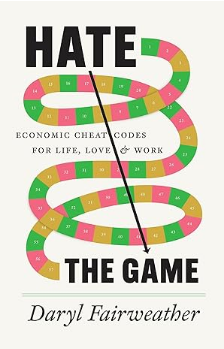 ● The Thinking Machine: Jensen Huang, Nvidia, and the World’s Most Coveted Microchip
● The Thinking Machine: Jensen Huang, Nvidia, and the World’s Most Coveted Microchip
Stephen Witt
Review via The Economist
Jensen Huang co-founded Nvidia in 1993 and has run it since, making him one of Silicon Valley’s longest-serving CEOs. He is among the most approachable—happy to entertain journalists when other tech bosses skulk behind a PR firewall—and, with his signature black leather jacket, among the most recognisable. Yet he remains an elusive subject. Nvidia’s $73bn in net profit last year, not far behind Microsoft’s $88bn, points to a strategic genius at work. His rambling disquisitions on earnings calls scream dumb luck. Which is it?
A new book suggests the answer is both. “The Thinking Machine” by Stephen Witt, a journalist, is the second such corporate biography; “The Nvidia Way” by Tae Kim, a former equity analyst, was published in December and covers similar ground. But Mr Witt approaches his subject with a more critical eye and more verve. He weaves together the story of the man, his company and the computer science that led to large language models (llms) such as ChatGPT, which brought “generative” AI to the masses in 2022.
 ● Financial Statement Analysis for Value Investing
● Financial Statement Analysis for Value Investing
Stephen Penman and Peter F. Pope
Summary via publisher (Columbia U. Press)
How should an investor challenge the market price and find value? This book provides a new lens, arguing that value investing is a matter of understanding the business through accounting. Stephen Penman and Peter F. Pope—leading authorities on accounting and its investment applications—demonstrate why attention to financial statements is the key to judicious valuation. More broadly, they show that accounting fundamentals, when analyzed in a systematic manner, teach us how to think about value in new ways.
 ● Hate the Game: Economic Cheat Codes for Life, Love, and Work
● Hate the Game: Economic Cheat Codes for Life, Love, and Work
Daryl Fairweather
Interview with author via Marketplace.org
Economic uncertainty, like we are living through right now, can make regular purchasing decisions challenging. Even more so decisions around big life moments, like changing your job, buying a house or deciding when or if to get married.
These choices have major consequences in our lives and finances; can a better understanding of economic theory help us make better life choices?
Daryl Fairweather is chief economist at Redfin and author of “Hate the Game: Economic Cheat Codes for Life, Love, and Work.” She joined “Marketplace” host Kimberly Adams to talk about how to apply economic theories to our choices in order to get winning results.
 ● The Real Retirement Crisis: Why (Almost) Everything You Know About the US Retirement System Is Wrong
● The Real Retirement Crisis: Why (Almost) Everything You Know About the US Retirement System Is Wrong
Andre Biggs
Review via MarketWatch.com
What if the pundits, the media and the policymakers are all wrong about retirement? There isn’t a personal-savings crisis; people already are responsible, working longer and claiming Social Security later; and retirees feel secure.
That’s according to Andrew Biggs, a senior fellow at the right-leaning American Enterprise Institute think tank, per his new book “The Real Retirement Crisis: Why (Almost) Everything You Know About the U.S. Retirement System Is Wrong.”
Biggs, who studies studies Social Security reform, state and local government pensions, and public-sector pay and benefits, maps out an argument that says most of the retirement data are flawed in some way and the views on the past are just plain wrong.
Please note that the links to books above are affiliate links with Amazon.com and James Picerno (a.k.a. The Capital Spectator) earns money if you buy one of the titles listed. Also note that you will not pay extra for a book even though it generates revenue for The Capital Spectator. By purchasing books through this site, you provide support for The Capital Spectator’s free content. Thank you!